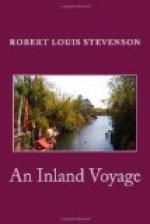Of all the creatures of commercial enterprise, a canal barge is by far the most delightful to consider. It may spread its sails, and then you see it sailing high above the tree-tops and the windmill, sailing on the aqueduct, sailing through the green corn-lands: the most picturesque of things amphibious. Or the horse plods along at a foot-pace as if there were no such thing as business in the world; and the man dreaming at the tiller sees the same spire on the horizon all day long. It is a mystery how things ever get to their destination at this rate; and to see the barges waiting their turn at a lock, affords a fine lesson of how easily the world may be taken. There should be many contented spirits on board, for such a life is both to travel and to stay at home.
The chimney smokes for dinner as you go along; the banks of the canal slowly unroll their scenery to contemplative eyes; the barge floats by great forests and through great cities with their public buildings and their lamps at night; and for the bargee, in his floating home, ‘travelling abed,’ it is merely as if he were listening to another man’s story or turning the leaves of a picture-book in which he had no concern. He may take his afternoon walk in some foreign country on the banks of the canal, and then come home to dinner at his own fireside.
There is not enough exercise in such a life for any high measure of health; but a high measure of health is only necessary for unhealthy people. The slug of a fellow, who is never ill nor well, has a quiet time of it in life, and dies all the easier.
I am sure I would rather be a bargee than occupy any position under heaven that required attendance at an office. There are few callings, I should say, where a man gives up less of his liberty in return for regular meals. The bargee is on shipboard—he is master in his own ship—he can land whenever he will—he can never be kept beating off a lee-shore a whole frosty night when the sheets are as hard as iron; and so far as I can make out, time stands as nearly still with him as is compatible with the return of bed-time or the dinner-hour. It is not easy to see why a bargee should ever die.
Half-way between Willebroek and Villevorde, in a beautiful reach of canal like a squire’s avenue, we went ashore to lunch. There were two eggs, a junk of bread, and a bottle of wine on board the Arethusa; and two eggs and an Etna cooking apparatus on board the Cigarette. The master of the latter boat smashed one of the eggs in the course of disembarkation; but observing pleasantly that it might still be cooked a la papier, he dropped it into the Etna, in its covering of Flemish newspaper. We landed in a blink of fine weather; but we had not been two minutes ashore before the wind freshened into half a gale, and the rain began to patter on our shoulders. We sat as close about the Etna as we could. The spirits burned with great ostentation; the grass caught flame




